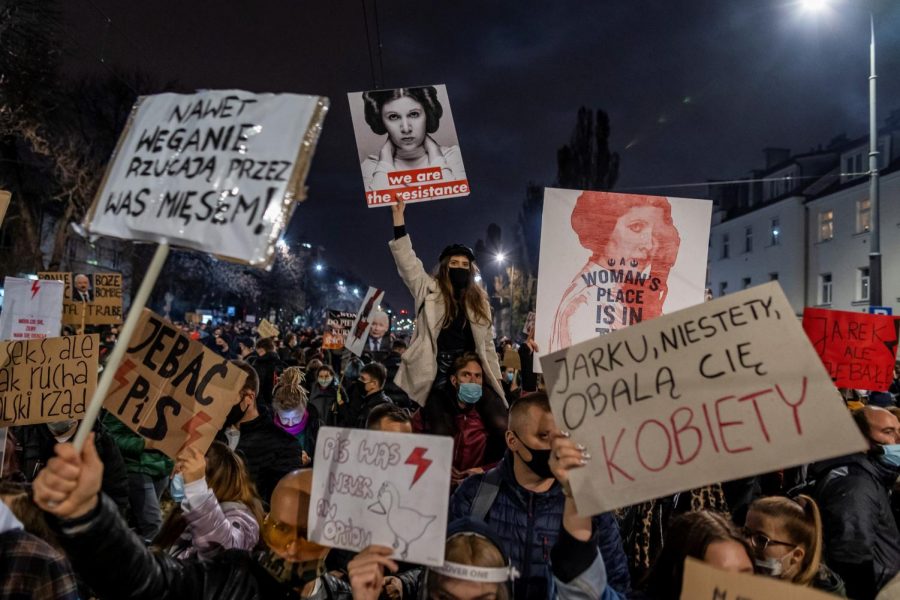Protests in Poland Show Need for Reproductive Rights
Protestors in Poland and around the world took to the streets in response to the country passing its strictest abortion regulations on Oct. 22 since legalizing it in the mid-20th century. As of right now, implementation of the near-total abortion ban has been halted, but demonstrations have not. Protestors have been revolting against the attack on bodily autonomy in the Polish capital, Warsaw, since late October, numbering anywhere from 100,000 to 150,000, and hundreds of thousands more are partaking in over 400 demonstrations around the country. These are the largest protests Poland has seen since the country’s revolt against communism in the late 1980s.
Poland’s new regulations would ban the abortion of fetuses with severe birth defects that would cause them to die shortly after birth, which was previously one of the three circumstances when legal abortions could be performed. Currently, these procedures make up nearly all terminations performed in Poland. The only remaining instances in which abortion was allowed in the country was if a pregnancy was a result of rape or incest or if it posed a threat to the mother’s life. Even then, doctors retained the right to refuse to perform the procedure.
Despite Europe’s new wave of COVID-19 infections and restrictions prohibiting gatherings of more than five people, Polish protesters are gathering in large numbers. The leader of Poland’s ruling Law and Justice Party, Jarosław Kaczyński, called the activists “criminals” for ignoring COVID-19 restrictions meant to protect the population. However, some see Kaczyński’s concern for the spread of COVID-19 as a hollow excuse to further the party’s right-wing agenda without having to confront the wrath of the Polish population. Regardless of motives, his strategy didn’t work.
My friend Iga Karasinska, 19, who lives in Poland and is invested in the protests, has a firsthand account of the social unrest. She finds that the new restriction proposed by the Law and Justice Party is “atrocious and [diminishes] the value of Polish women.” In speaking about Poland’s COVID-19 restrictions, Karasinka says, “protesters took safety measures seriously, everybody was carrying masks, keeping safe distance if possible, and kept their hands sanitized.” Additionally, activists who were unable to take to the streets sent mass emails to government agencies, including members of the ruling Law and Justice Party and the Constitutional Tribunal, and university students organized a day where they did not show up to classes, instead using that time to protest. Karasinska said “Polish women did stand up for themselves and went out on the streets despite the Covid situation since basic human rights are the very basis of the society. If they fail, everything fails.”
One cannot ignore the parallels between Poland’s ongoing struggle for women’s rights and that of the United States. In the past few years, the U.S. has also seen alarming rollbacks of abortion rights at the state level, although Roe v. Wade still stands at the federal level. Both countries’ restrictions on abortion arise from growing right-wing sentiment and ties between church and state, or the influence of religion on government.
It’s no secret that abortion has always been opposed in the name of religion, but the Polish government’s relationship with the Catholic church is much stronger than the U.S.’s relationship with any single religion. In response to this association, Polish protesters have taken to disrupting church services, attempting to hold the church accountable for its role in limiting the bodily autonomy of women. In one instance,, protesters disrupted mass at Poznan Cathedral on Oct. 25, carrying signs and chanting “Catholics need abortions too.” This is not the first time Poland has used its staunchly Catholic identity to deny their citizens’ civil liberties, another prime example being Poland’s utter rejection of the LGBTQ+ community and so-called “LGBT-free zones.” Poland’s Catholic ties are at the heart of its national identity, and the church’s dominance has undoubtedly influenced the country’s human rights violations.
So, what do all of these reproductive restrictions mean? The answer is easy: A woman cannot make a decision about her own body, but the government can. Abortion is a right protected by the U.N. Human Rights Committee, and it is disgusting that the government can make one of the most personal decisions a woman may face in her life. Women will never be equal in a society where they cannot make their own decisions; they will never be free and respected individuals if they do not have bodily autonomy. The abortion bans in Poland and around the world are instated to keep women subjugated, and women are sick of it. A global pandemic is not going to stop them from fighting for a right they deserve just by virtue of existing.
I believe in women, and I believe women. If they think that having an abortion, no matter the reason, is the best choice for them, they should be allowed to make that choice without state interference. Polish women, according to Karasinska, are tired of “living in a country where people have to fight over something that in the West was granted many years ago.” Poles throughout the nation have faith that the restriction, or this “giant step backwards,” as Karasinska calls it, will never actually be enacted, as its progress was indefinitely delayed on Nov. 4. Polish protesters hope that equality and freedom will reign triumphant over government-implemented human rights violations.
The last time the Poles protested like this, they triumphed over a repressive government. Maybe they can do it again.
Nicole Braun, FCRH ’24, is undecided and from Saddle River, N.J.

Nicole Braun is a senior from Saddle River, N.J. and she is thrilled to be a member of Volume 105! Her love for writing and editing led her to begin writing...










































































































































































































